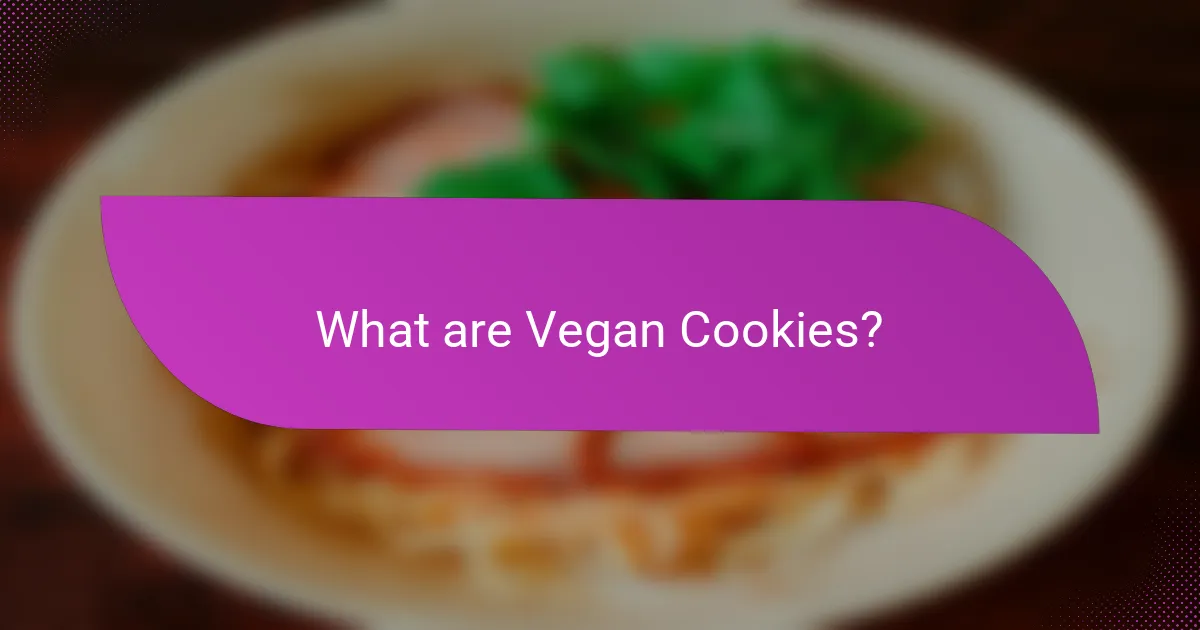Vegan cookies are cookies made without any animal-derived ingredients, utilizing plant-based substitutes for eggs and dairy. This article explores the essential ingredients used in vegan cookies, including flour, sugar, plant-based oils, and alternative milk, as well as common egg substitutes such as flaxseed meal and applesauce. It also highlights the health benefits of vegan cookies and popular flavor combinations that appeal to both vegans and those with dietary restrictions. The increasing popularity of veganism has led to a wider availability of vegan cookie recipes and pre-packaged options in stores, catering to a growing audience seeking delicious, plant-based treats.

What are Vegan Cookies?
Vegan cookies are cookies made without any animal-derived ingredients. They typically use plant-based substitutes for eggs and dairy. Common ingredients include flour, sugar, plant-based oils, and alternative milk. Popular egg substitutes are flaxseed meal or applesauce. Vegan cookies can be made with various sweeteners like maple syrup or agave nectar. They are often enjoyed by those following a vegan lifestyle or those with dairy or egg allergies. The rise in popularity of veganism has led to an increase in vegan cookie recipes and products. Many brands now offer pre-packaged vegan cookies in stores.
How do Vegan Cookies differ from traditional cookies?
Vegan cookies differ from traditional cookies primarily in their ingredients. Traditional cookies typically contain animal products like eggs and dairy. In contrast, vegan cookies use plant-based alternatives such as flaxseed or applesauce instead of eggs. They also replace butter with oils or vegan margarine. This results in different textures and flavors. Vegan cookies can be just as delicious and satisfying as traditional ones. Studies show that vegan baking can offer health benefits, such as lower cholesterol levels. This is due to the absence of animal fats.
What ingredients are typically used in Vegan Cookies?
Vegan cookies typically use plant-based ingredients. Common ingredients include flour, such as all-purpose or whole wheat. Sugar options often consist of cane sugar or coconut sugar. Plant-based fats like coconut oil or vegan butter are frequently used. Instead of eggs, alternatives like flaxseed meal or applesauce serve as binding agents. Non-dairy milk, such as almond or soy milk, is commonly included for moisture. Flavorings like vanilla extract and baking powder are also standard. These ingredients combine to create a variety of textures and flavors in vegan cookies.
Are there any common allergens in Vegan Cookies?
Yes, there are common allergens in vegan cookies. Common allergens include nuts, soy, and gluten. Many vegan cookies use almond flour or peanut butter, which can trigger nut allergies. Additionally, some recipes incorporate soy products like tofu or soy milk. Gluten is present in wheat flour, which is often used in baking. It is crucial for individuals with allergies to read ingredient labels carefully. Awareness of these potential allergens can prevent allergic reactions.
What are the health benefits of Vegan Cookies?
Vegan cookies offer several health benefits. They are typically lower in saturated fat compared to traditional cookies. This is due to the absence of butter and eggs. Vegan cookies often contain whole grains and nuts. These ingredients provide essential nutrients and fiber. High fiber content can aid digestion and promote satiety. Many vegan cookies use natural sweeteners like maple syrup or agave. These alternatives can have a lower glycemic index than refined sugars. Additionally, vegan cookies can be rich in antioxidants from ingredients like dark chocolate or fruits. Antioxidants help combat oxidative stress in the body. Overall, vegan cookies can be a healthier treat option when made with wholesome ingredients.
How do Vegan Cookies contribute to a balanced diet?
Vegan cookies can contribute to a balanced diet by providing plant-based nutrients. They often include ingredients like whole grains, nuts, and seeds. These ingredients offer fiber, healthy fats, and protein. Fiber aids digestion and helps maintain a healthy weight. Healthy fats from nuts and seeds support heart health. The protein content helps with muscle repair and growth. Additionally, vegan cookies can be lower in saturated fat compared to traditional cookies. This makes them a healthier snack option. Incorporating vegan cookies in moderation can satisfy sweet cravings while still supporting overall health.
What nutritional advantages do Vegan Cookies offer compared to non-vegan options?
Vegan cookies offer several nutritional advantages compared to non-vegan options. They typically contain healthier fats, such as those from nuts and seeds, instead of saturated fats found in dairy. Vegan cookies often include whole grains, providing more fiber than cookies made with refined flour. This fiber aids digestion and promotes satiety. Additionally, vegan cookies are usually lower in cholesterol since they do not contain animal products. They may also have higher antioxidant levels due to the inclusion of fruits and nuts. Studies indicate that plant-based diets can reduce the risk of chronic diseases. Overall, vegan cookies can be a more nutrient-dense option when made with wholesome ingredients.
What are the popular flavor combinations for Vegan Cookies?
Popular flavor combinations for vegan cookies include chocolate chip and walnut, oatmeal and raisin, and peanut butter and chocolate. Other favorites are snickerdoodle with cinnamon, coconut and almond, and pumpkin spice with pecans. These combinations often enhance taste and texture. Chocolate chip cookies are a classic, appealing to many. Oatmeal raisin cookies provide a chewy texture and wholesome flavor. Peanut butter chocolate cookies offer a rich, nutty taste. Each combination caters to diverse palates.
Which ingredients are commonly paired for unique Vegan Cookie flavors?
Commonly paired ingredients for unique vegan cookie flavors include almond flour, coconut sugar, and dark chocolate. Almond flour adds a nutty flavor and moist texture. Coconut sugar provides a caramel-like sweetness that complements various ingredients. Dark chocolate enhances the richness and depth of flavors. Other popular combinations include peanut butter with oats, and maple syrup with pumpkin spice. These pairings create distinctive taste profiles in vegan cookies.
How can flavor combinations enhance the taste of Vegan Cookies?
Flavor combinations can significantly enhance the taste of vegan cookies by creating a more complex and enjoyable flavor profile. Pairing ingredients like chocolate and nuts introduces contrasting textures and flavors. For example, the richness of dark chocolate complements the crunchiness of walnuts. Additionally, combining spices such as cinnamon and nutmeg can add warmth and depth to the cookie’s flavor.
Using fruit purees, like banana or applesauce, alongside vanilla extract can provide natural sweetness and moisture. This combination can prevent the cookies from becoming dry. Moreover, incorporating ingredients like coconut or almond extract can introduce unique aromatic qualities.
Research indicates that flavor pairing can elevate the overall sensory experience of baked goods. A study by the Flavor Network found that certain flavors enhance each other, leading to a more satisfying taste. Thus, thoughtful flavor combinations are essential for maximizing the enjoyment of vegan cookies.
How can you make Vegan Cookies at home?
To make vegan cookies at home, start with plant-based ingredients. Use flour, sugar, baking powder, and a fat substitute like coconut oil or applesauce. Combine the dry ingredients in one bowl. Mix the wet ingredients in another bowl. Then, combine both mixtures until a dough forms. You can add vegan chocolate chips or nuts for flavor. Preheat the oven to 350°F (175°C). Scoop the dough onto a baking sheet. Bake for 10-12 minutes until golden. Allow the cookies to cool before serving. This method ensures a delicious vegan treat that is easy to prepare.
What are some easy recipes for beginners?
Some easy recipes for beginners include vegan cookies made with simple ingredients. A basic recipe involves mixing flour, sugar, baking soda, and plant-based butter. You can add ingredients like oats, chocolate chips, or nuts for flavor. Another easy option is banana oat cookies, which require just mashed bananas and oats. These recipes are straightforward and require minimal cooking skills. They allow beginners to practice measuring and mixing without complicated techniques. Vegan cookies can be baked in about 10-15 minutes, making them a quick treat.
What tips can help ensure perfect Vegan Cookies every time?
Use a reliable vegan cookie recipe for consistent results. Measure ingredients accurately to maintain the right balance. Use room temperature ingredients for better mixing. Choose the right flour type; all-purpose flour is commonly used. Incorporate a binding agent like flaxseed meal or aquafaba for structure. Avoid overmixing the dough to prevent tough cookies. Bake at the correct temperature, typically around 350°F (175°C), for even cooking. Allow cookies to cool on the baking sheet before transferring to a wire rack for optimal texture.
What are the best practices for storing Vegan Cookies?
Store vegan cookies in an airtight container to maintain freshness. This prevents moisture and air exposure, which can lead to staleness. Use parchment paper to separate layers of cookies if stacking them. This minimizes sticking and maintains texture. Keep the container in a cool, dry place away from direct sunlight. Refrigeration can extend shelf life but may alter texture. For longer storage, freeze the cookies in a freezer-safe bag. This method preserves flavor and prevents freezer burn. Properly stored, vegan cookies can last up to a week at room temperature, two weeks in the fridge, and three months in the freezer.
How can you maintain freshness and flavor in Vegan Cookies?
To maintain freshness and flavor in vegan cookies, store them in an airtight container. This prevents moisture loss and keeps the cookies soft. Adding ingredients like applesauce or nut butter enhances moisture retention. Use spices like cinnamon or vanilla extract to boost flavor. Refrigerating cookies can extend their shelf life. For longer storage, freeze the cookies. Thaw them at room temperature before serving for optimal taste. These methods are effective in preserving both freshness and flavor over time.
What are the signs that Vegan Cookies have gone bad?
Vegan cookies may have gone bad if they show signs of mold, an off smell, or unusual texture. Mold appears as green or black spots on the surface. An off smell can indicate spoilage, often resembling sourness or rancidity. A change in texture, such as becoming excessively hard or overly soft, suggests they are no longer fresh. Additionally, if they taste off or different from when they were made, it’s a sign they should not be consumed. Proper storage can help prevent spoilage, but these signs indicate that the cookies should be discarded.
Vegan cookies are baked goods made without any animal-derived ingredients, utilizing plant-based substitutes for eggs and dairy. This article covers the key ingredients commonly used in vegan cookies, their health benefits, and how they differ from traditional cookies. It also explores popular flavor combinations, offers easy recipes for beginners, and provides tips for perfect baking and proper storage. Additionally, the article highlights potential allergens and signs of spoilage to ensure safe consumption.




